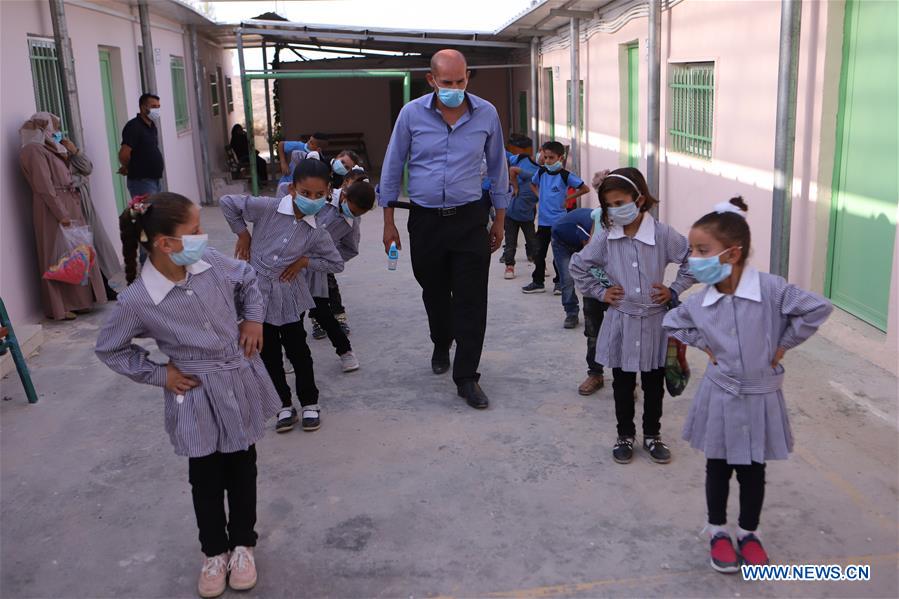
Students are seen at a school in the West Bank city of Hebron, on Sept. 7, 2020. Palestinian students from the West Bank on Sept. 6 began the new school year after six-month suspension due to the novel coronavirus. (Photo by Mamoun Wazwaz/Xinhua)
by Sanaa Kamal
RAMALLAH, Sept. 6 (Xinhua) -- On Sunday, hundreds of thousands of Palestinian children returned to schools in the West Bank following a six-month closure imposed due to the outbreak of the novel coronavirus in the Palestinian territories.
All schools run by the Palestinian Authority (PA) Ministry of Education, and private institutions run by the UN Relief and Works Agency for Palestine Refugees in the Near East (UNRWA), reopened amid the strict precautionary and preventive measures.
The PA decided that all students in from grades one to four, as well as the 12th grade, will start their lessons in classrooms, while the rest of the students will join them two weeks later.
Meanwhile, Sadiq al-Khadour, a spokesman of the PA Ministry of Education, said in a press statement that about 300,000 students have returned to their classes, adding that they are obliged by precautionary measures including wearing of facial masks and gloves.
Besides, ahead of the school year, all education institutions were sterilized, according to al-Khadour.
Al-Khadour added that Palestinian students are returning gradually to schools. Each student will attend classes for only three days a week as part of precautionary measures to contain the virus.
Muawiya Omar, head of the UNRWA Education Program in the West Bank, told Xinhua that about 46,000 Palestine refugee students have returned to 96 schools belonging to the UNRWA in various districts of the West Bank.
"We will implement a series of programs that aim at presenting psychological support to the students who have been negatively affected by staying at home for a long time," he said, while inspecting a school in Balata refugee camp in the city of Nablus.
Both the governmental and UNRWA schools will be encouraged to integrate traditional education with distance learning, to reduce the number of hours for students to stay at schools.
Besides, officials decided to close the school canteens in the current period, calling on students to bring their own food and water bottles from home.
Wearing face masks and keeping social distance, about 15 students of the second grade gathered in a classroom to have their first lesson about a healthy lifestyle.
Mohammed al-Khaldy from Ramallah city was among those students. He told Xinhua that he is "so happy to restore my lessons" as well as to meet his friends.
His mother Nour al-Khaldy, however, was less optimistic. She expressed her fear that her child could be infected with the virus if students do not adhere to health instructions. The 28-year-old mother of three told Xinhua that it is "very important to resume the education process in Palestine, but it must be followed by strict healthy measures."
For his part, Bassem Erekat, a general director of Education in Ramallah and Al-Bireh, told Xinhua that their academic staff will teach students how to deal with COVID-19 by urging them to follow health instructions and making the precautionary measures a part of their daily routine.
On March 5, the Palestinian government declared a state of emergency, imposing a series of precautionary restrictions. All schools, universities, mosques, and restaurants were shut down, and public gatherings have been prohibited, especially in the marketplaces.
So far, Palestine has recorded 33,250 cases infected with the novel coronavirus, including 199 fatalities. Enditem



